Are you looking to enhance your team's skills in handling bodily fluids safely? Our comprehensive bodily fluid cleaning training provides essential knowledge and practical guidance for managing hazardous spills effectively. With both online training options and in-person sessions, we equip your staff with the expertise needed to handle spill kits and maintain workplace safe environments.
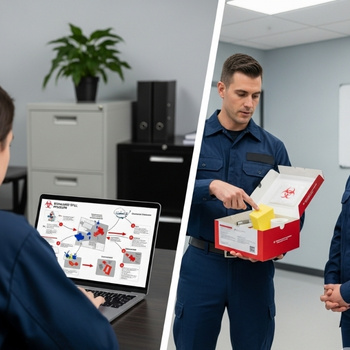

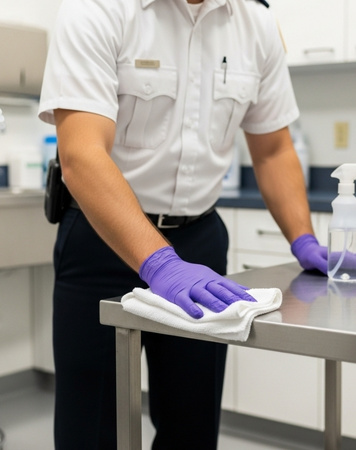
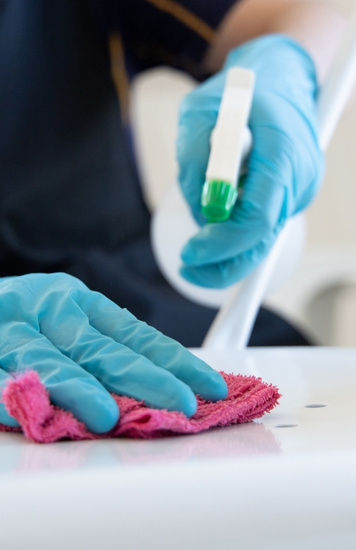
Professional training bodily fluids handling has never been more critical. Our bodily fluids training course delivers ultra-efficient learning in just 15 minutes per module, making it perfect for compliance training without disrupting productivity. We focus on practical, hands-on approaches that help users develop awareness of potential health risks while learning to effectively deal with various spillage scenarios.
Our course covers everything from basic spill kit training to advanced decontamination procedures. Each online training course module is designed to provide comprehensive knowledge about handling spillages, using personal protective equipment correctly, and maintaining health and safety standards throughout the cleaning process.
If you are looking into how to start a biohazard cleaning business or how to become a crime scene cleaner then this is essential!
Unlike generic online training offerings, our elearning course specifically targets the unique challenges faced by biohazard cleaning professionals. We understand that managing infection risks requires specialized knowledge about control of substances hazardous to health regulations and current legislation.
Our training approach focuses on real-world application. Users learn to handle spills of bodily fluids using proper techniques, equipment safety procedures, and appropriate spill kits dealing with different contamination scenarios. The course completion process includes practical assessments that ensure participants can confidently handle bodily fluid spills in their work environment.
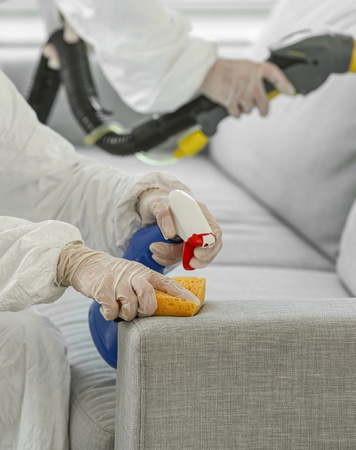
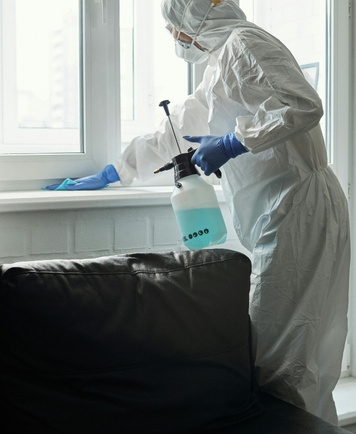
This foundational module covers essential concepts for understanding biohazard cleaning. Participants learn about different types of hazardous substances and the risks associated with bodily fluid exposure. We explore legal requirements and the importance of prompt response to bodily fluids incidents.
Understanding current legislation is crucial for professional practice. This module covers health regulations including OSHA, HSE requirements, and substances hazardous to health compliance. We examine key legal obligations and the importance of accurate documentation in biohazard scenarios.
Learning to safely use PPE forms the cornerstone of safe practice. This module covers selection, proper donning and doffing procedures, and disposal of contaminated protective equipment. Participants practice with various PPE types including gloves, masks, protective suits, and face shields.
Risk assessment skills are essential for safe cleaning operations. This training course module teaches participants to identify different body fluids, conduct thorough site surveys, and communicate potential risks to team members. We cover documentation requirements and protocol determination processes.
Effective cleaning techniques vary depending on surface types and contamination levels. Participants learn proper disinfection methods including fogging, wiping, and soaking techniques. We emphasize the importance of dwell time and correct product application for maximum effectiveness against pathogens.
Proper waste disposal prevents cross-contamination and ensures regulatory compliance. This module covers waste classification, red bagging procedures, sharps container usage, and transportation requirements. Participants learn safe disposal methods for contaminated cleaning tools and protective equipment.
Managing infection risks requires systematic approaches to contamination control. We teach hand hygiene protocols, surface disinfection techniques, and area isolation procedures. This training emphasizes proper cleaning order and containment strategies to minimize hazardous spills impact.
Advanced decontamination techniques ensure thorough cleaning of affected areas. Participants learn chemical, heat-based, and UV light decontamination methods. We cover specialized equipment usage including steam cleaners, HEPA vacuums, and verification procedures for successful decontamination.
Immediate response procedures can prevent serious health consequences. This module covers exposure response protocols, incident reporting requirements, and follow-up procedures. We emphasize the importance of root cause analysis for preventing future incidents.
Working with bodily fluids can be emotionally challenging. This module addresses psychological impacts and provides stress management techniques. We discuss available support resources and encourage open communication about mental health concerns.
Professional communication skills are essential when dealing with sensitive situations. Participants learn to discuss biohazard scenarios tactfully, explain cleaning processes clearly, and manage client expectations effectively while maintaining confidentiality.
Our comprehensive assessment process includes written tests and practical evaluations. Upon course completion, participants receive certification demonstrating their competency in bodily fluid handling and spill kit operation. This certification supports compliance requirements across various industry sectors.
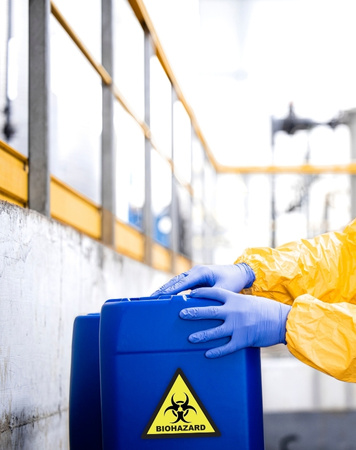
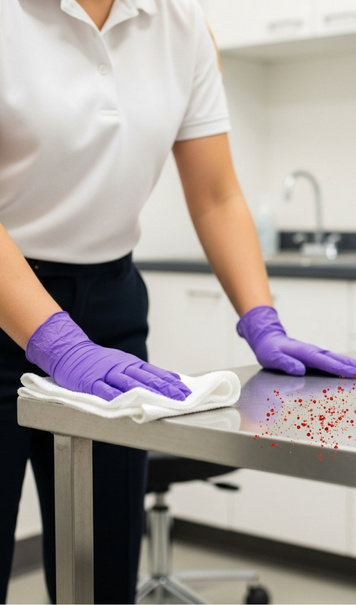
We offer flexible delivery methods to accommodate different learning preferences. Our elearning courses provide convenient access for remote learning, while our in-person sessions offer hands-on practice with actual spill kits and equipment. Both options include the same comprehensive curriculum and lead to identical certification outcomes.
Our online course platform allows participants to learn at their own pace while accessing course transcripts and supplementary materials. The system tracks progress and provides completion date verification for compliance purposes.
Live training sessions provide direct interaction with instructors and hands-on practice with spill kits. Participants can ask questions immediately and receive personalized feedback on their technique. Group sessions encourage peer learning and discussion about real-world scenarios encountered in different workplace environments.
Our spill kit training covers comprehensive kit contents and usage procedures. Standard spill kits typically include PPE components such as gloves, eye protection, and aprons, plus absorbents like pads and granules, disinfection supplies, biohazard disposal bags, and tools such as scrapers or scoops. According to safety guidelines, kits should contain granular disinfectant with at least 10,000 ppm chlorine concentration.
Spill kits dealing with bodily fluids must include specific components for safe cleanup operations. Health Services specifications require disposable gloves, face shields, aprons, absorbent powders, disposal bags, and disinfectant wipes. Academic institutions emphasize having pre-stocked spill kits containing absorbents, biohazard bags, disinfectant, forceps, and eye protection tailored to specific environmental risks.
Training modules cover proper documentation procedures and compliance requirements. Participants learn to inspect, replenish, and log spill kit contents to maintain readiness and support audit requirements. This systematic approach helps organizations stay prepared while meeting regulatory obligations under substances hazardous to health legislation.
Healthcare settings require staff training for safe blood and bodily fluid spillage handling. Our training emphasizes immediate response protocols and proper equipment selection for different contamination scenarios. We teach participants to prevent spillages through proactive measures while preparing them to effectively deal with unavoidable incidents.
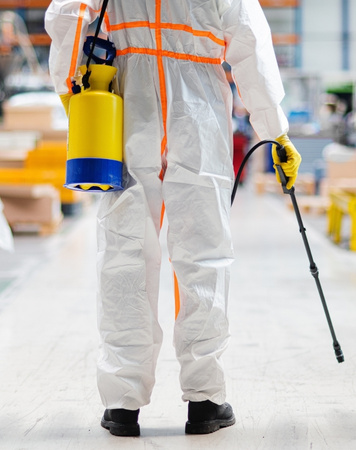
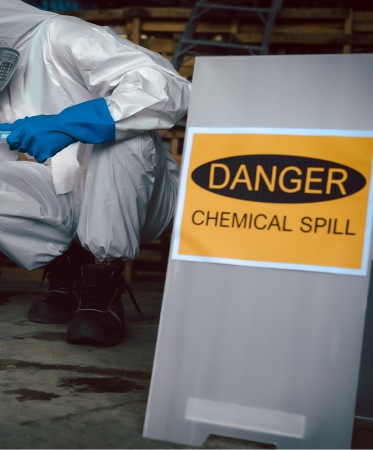
Explore how our students praise the transformative journey provided by Biohazard Cleaning Courses and their pathway to success.
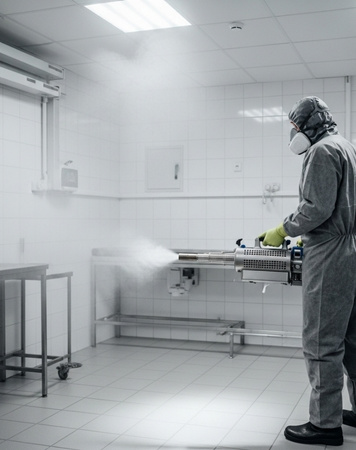
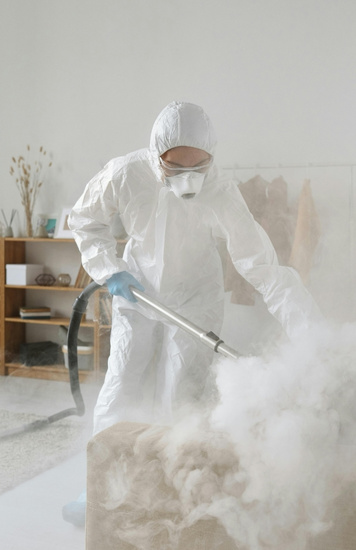
Completion of our bodily fluid cleaning training enhances professional credentials and demonstrates commitment to workplace safety. The certification supports career advancement in healthcare, cleaning services, and emergency response sectors. Many participants report increased confidence in handling challenging cleanup situations after completing our comprehensive training program.
Our training provides practical skills that translate directly to improved job performance. Participants learn efficient techniques that reduce cleanup time while improving safety outcomes. The knowledge gained supports both individual professional development and organizational safety objectives. If you are wanting to increase your biohazard cleanup salary then this course and our crime scene cleaner courses are definitely one route to take.
Read more here about “how much do crime scene cleaners make?”.
15 years of expertise in biohazard training excellence.
Over 3000 professionals certified. Master the art of specialized cleaning.
Over 1500 satisfied professionals trust our biohazard training.
Thorough, hands-on training solutions for a safer professional environment.
Our training program aligns with Control of Substances Hazardous to Health regulations (COSHH) and meets standards established by leading safety organizations. The curriculum incorporates best practices from healthcare, emergency services, and professional cleaning industries to ensure comprehensive skill development.
We maintain strong relationships with industry associations and regularly update our content to reflect current best practices. This commitment to excellence ensures our graduates receive training that meets or exceeds industry expectations for biohazard cleaning training & handling competency.
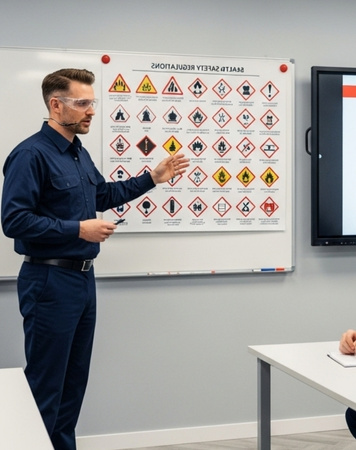
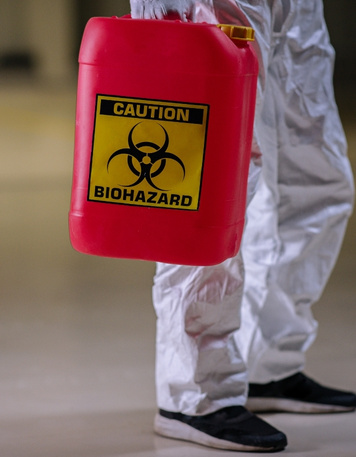
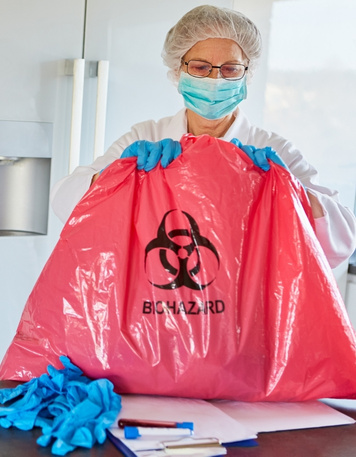
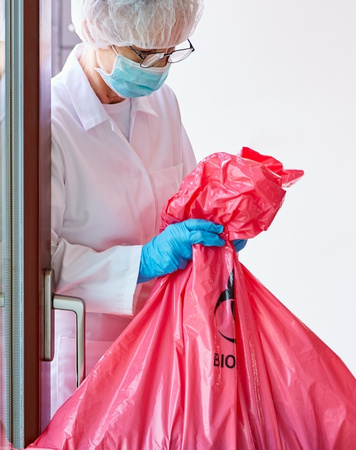
Understanding that different organizations have varying training needs, we offer bulk purchases options for larger teams. Group discounts apply to organizations training multiple personnel simultaneously. Our flexible scheduling accommodates shift work and operational requirements common in healthcare and emergency services environments.
Course modules cover different scenarios encountered across various industry sectors. From healthcare facilities to crime scene cleanup, our training prepares participants for diverse applications of bodily fluid handling skills. This versatility makes our program valuable for organizations serving multiple client types.
Our online training platform utilizes modern elearning technology to deliver engaging, interactive content. The system provides immediate feedback through test questions and tracks individual progress throughout the course. Participants access training materials through user-friendly interfaces that work effectively across different devices and operating systems.
For organizations requiring specialized training approaches, we offer customization options that address specific operational requirements. This flexibility ensures training relevance while maintaining core safety and compliance objectives.
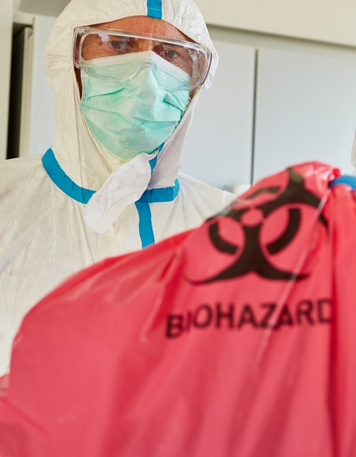
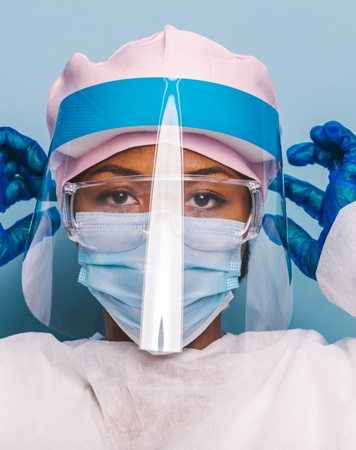
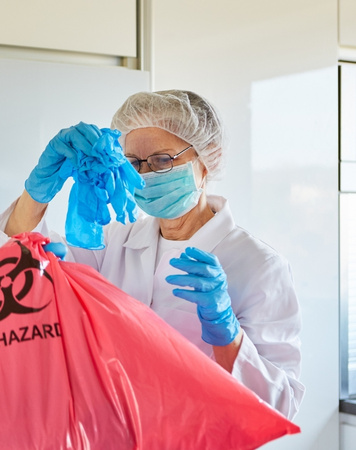
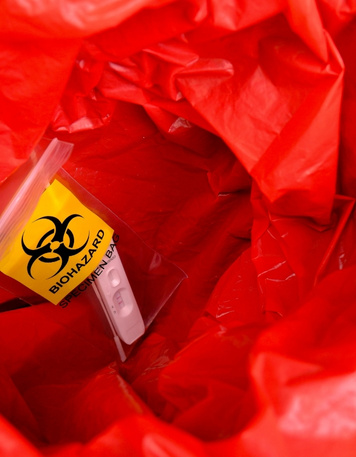
All training materials undergo rigorous review processes to ensure accuracy and relevance. Our instructional team includes experienced professionals from biohazard cleanup, healthcare, and emergency response backgrounds. This diverse expertise ensures comprehensive coverage of real-world applications and current industry practices.
We regularly collect feedback from participants and employers to continuously improve our training delivery. This commitment to quality assurance ensures our program remains effective and relevant to changing industry needs.
Our end of course test validates participant understanding through comprehensive evaluation of key concepts. The assessment covers practical application scenarios, regulatory requirements, and safety procedures. Successful completion demonstrates competency in essential bodily fluid handling skills.
Assessment results provide detailed feedback on individual performance areas. This information helps participants identify strengths and areas for continued development. Organizations receive summary reports supporting their training documentation and compliance requirements.
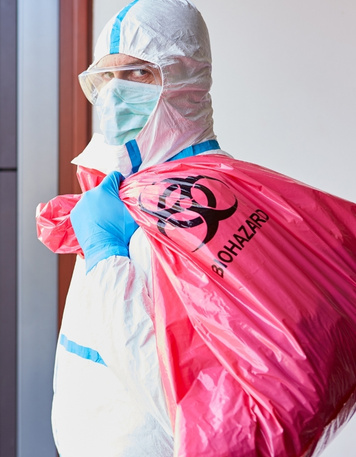
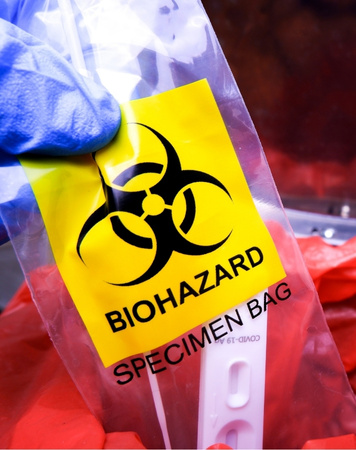
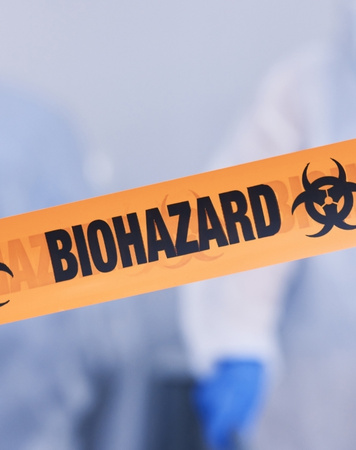

Training doesn't end with certification. We provide ongoing support through updated materials, refresher training options, and consultation services. This comprehensive approach ensures long-term competency maintenance and adaptation to evolving industry standards.
Our commitment to participant success extends beyond initial training completion. We maintain resources that support continued learning and professional development in biohazard handling specialties.
To complement our comprehensive training program, we provide additional resources including a free e checklist for spill kit maintenance, safety protocols, quick reference guides, and accident reporting templates. These tools support ongoing compliance and safety management and answer questions like “what insurance do I need for biohazard cleanup?”
Our free e resources help organizations maintain training effectiveness between formal sessions. Regular access to updated materials ensures continued awareness of best practices and regulatory changes affecting biohazard handling procedures. Knowing the answer to problems like “how to remove bad smell from a room naturally?” will become second nature.
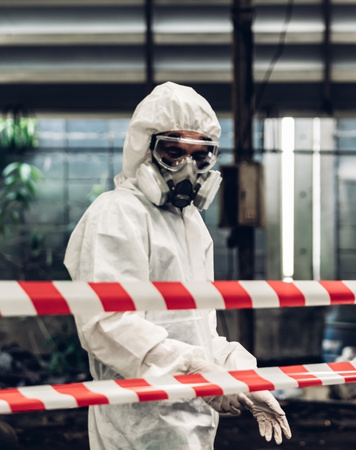

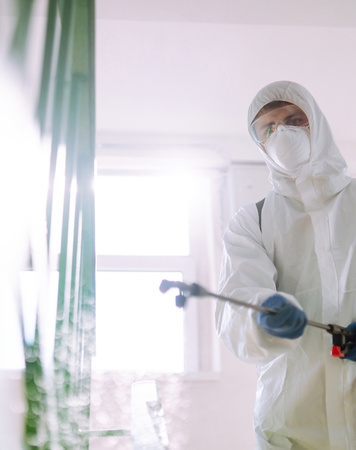

Ready to enhance your team's bodily fluid cleaning capabilities? Biohazard Cleaning Courses offers the comprehensive biohazard cleaning training course your organization needs to handle hazardous spills safely and effectively. Our expert instructors and proven curriculum provide the knowledge and skills essential for professional biohazard cleanup operations.
Contact us today to discuss your specific training requirements and receive a customized quote for your organization. Whether you need online course access for individual learners or comprehensive group training for entire departments, we have solutions that fit your needs and budget.
Don't wait until an emergency situation tests your team's preparedness. Invest in professional training now and ensure your staff can handle spill kits confidently while maintaining the highest safety standards. Get your free quote from Biohazard Cleaning Courses and take the first step toward enhanced workplace safety and regulatory compliance.
Have questions about biohazard cleaning training? Get expert advice today!